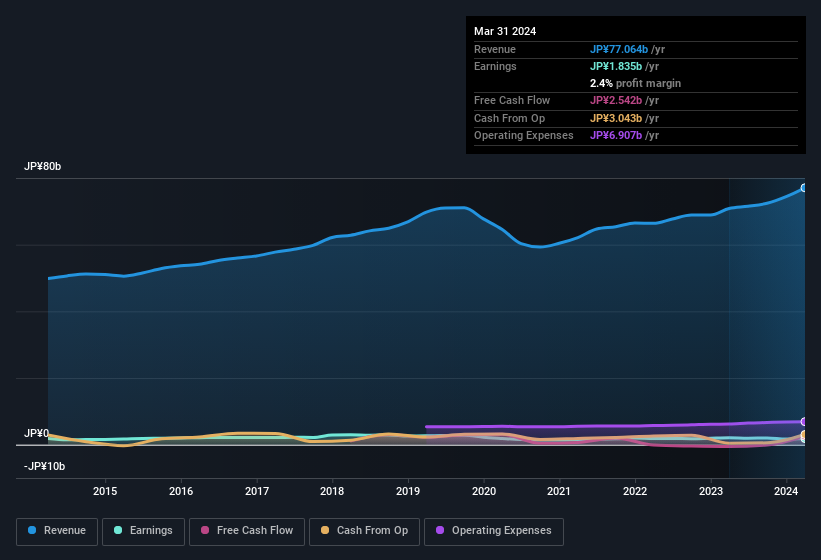- Japan
- /
- Healthcare Services
- /
- TSE:3183
We Think You Can Look Beyond WIN-Partners' (TSE:3183) Lackluster Earnings

The market for WIN-Partners Co., Ltd.'s (TSE:3183) shares didn't move much after it posted weak earnings recently. Our analysis suggests that while the profits are soft, the foundations of the business are strong.
See our latest analysis for WIN-Partners

Examining Cashflow Against WIN-Partners' Earnings
One key financial ratio used to measure how well a company converts its profit to free cash flow (FCF) is the accrual ratio. In plain english, this ratio subtracts FCF from net profit, and divides that number by the company's average operating assets over that period. The ratio shows us how much a company's profit exceeds its FCF.
That means a negative accrual ratio is a good thing, because it shows that the company is bringing in more free cash flow than its profit would suggest. While it's not a problem to have a positive accrual ratio, indicating a certain level of non-cash profits, a high accrual ratio is arguably a bad thing, because it indicates paper profits are not matched by cash flow. Notably, there is some academic evidence that suggests that a high accrual ratio is a bad sign for near-term profits, generally speaking.
For the year to March 2024, WIN-Partners had an accrual ratio of -0.13. That implies it has good cash conversion, and implies that its free cash flow solidly exceeded its profit last year. In fact, it had free cash flow of JP¥2.5b in the last year, which was a lot more than its statutory profit of JP¥1.84b. Given that WIN-Partners had negative free cash flow in the prior corresponding period, the trailing twelve month resul of JP¥2.5b would seem to be a step in the right direction.
Note: we always recommend investors check balance sheet strength. Click here to be taken to our balance sheet analysis of WIN-Partners.
Our Take On WIN-Partners' Profit Performance
WIN-Partners' accrual ratio is solid, and indicates strong free cash flow, as we discussed, above. Based on this observation, we consider it likely that WIN-Partners' statutory profit actually understates its earnings potential! And on top of that, its earnings per share have grown at 20% per year over the last three years. Of course, we've only just scratched the surface when it comes to analysing its earnings; one could also consider margins, forecast growth, and return on investment, among other factors. In light of this, if you'd like to do more analysis on the company, it's vital to be informed of the risks involved. Our analysis shows 2 warning signs for WIN-Partners (1 makes us a bit uncomfortable!) and we strongly recommend you look at these before investing.
Today we've zoomed in on a single data point to better understand the nature of WIN-Partners' profit. But there are plenty of other ways to inform your opinion of a company. Some people consider a high return on equity to be a good sign of a quality business. While it might take a little research on your behalf, you may find this free collection of companies boasting high return on equity, or this list of stocks with significant insider holdings to be useful.
Valuation is complex, but we're here to simplify it.
Discover if WIN-Partners might be undervalued or overvalued with our detailed analysis, featuring fair value estimates, potential risks, dividends, insider trades, and its financial condition.
Access Free AnalysisHave feedback on this article? Concerned about the content? Get in touch with us directly. Alternatively, email editorial-team (at) simplywallst.com.
This article by Simply Wall St is general in nature. We provide commentary based on historical data and analyst forecasts only using an unbiased methodology and our articles are not intended to be financial advice. It does not constitute a recommendation to buy or sell any stock, and does not take account of your objectives, or your financial situation. We aim to bring you long-term focused analysis driven by fundamental data. Note that our analysis may not factor in the latest price-sensitive company announcements or qualitative material. Simply Wall St has no position in any stocks mentioned.
About TSE:3183
WIN-Partners
Through its subsidiaries, distributes medical devices to medical institutions primarily in Japan.
Flawless balance sheet with proven track record and pays a dividend.
Market Insights
Community Narratives




